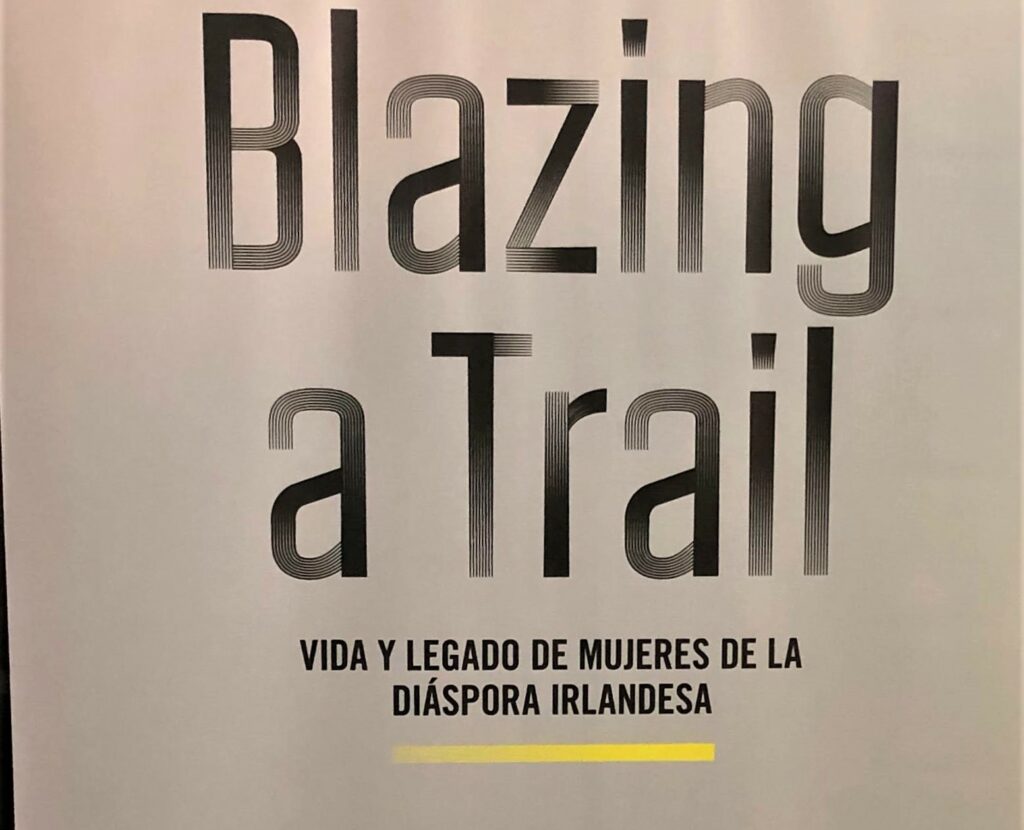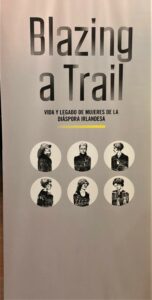Irish author Mary Costello gives a powerful talk as Blazing a Trail exhibition opens at UNAL.

Blazing a Trail: Irish women who changed the world is on display at UNAL’s Edificio Uriel Guttiérez until February 18.
“I’m learning too,” said Mary Costello, one of the loudest voices in contemporary Irish literature.
In her talk, “Women’s voices in literature and their role in modern Ireland,” at la Universidad Nacional de Colombia (UNAL) Sede Bogotá, Costello admitted to just recently understanding the uniqueness of her own perspective as a woman writer.
“She’s one of the most important writers in Ireland today,” said Irish ambassador to Colombia, Alison Milton when describing Costello.
The University’s Office of External Relations, the Embassy of Ireland, and Culture Ireland, an organisation that promotes Irish culture globally, jointly hosted Costello and opened a coinciding exhibition, Blazing a Trail: Irish women who changed the world, a historical look back on pioneering women in the Irish diaspora.
Creative Industries with Nick Barley, director of the Edinbrugh international book festival
In her introductory remarks, Ambassador Milton explained that both Costello’s talk and the exhibition are part of the Embassy’s celebration of Saint Brigid’s Day. Appropriately, Saint Brigid is a beloved Irish patron saint that celebrates women’s creativity. Milton also highlighted the strong ties between Ireland and UNAL, a partnership that promotes the global significance and influence of Irish culture and literature.
Who is Mary Costello?
Prior to focusing on writing exclusively, Costello was a teacher. Notably, she did not publish her first book, a widely acclaimed collection of short stories,The China Factory, until she was in her forties. Two years later, she published her first novel, Academy Street, for which she won the Irish Book Award and Irish Novel of the Year award.
To promote The River Capture, Costello travelled to Colombia for the first time. Prior to arriving in Bogotá this week, she spoke and led workshops at Cartagena’s annual literary event, The Hay Festival.
Alejandra Jaramillo, writer and Professor in UNAL’s humanities faculty, introduced Costello’s talk with excerpts from glowing reviews of The River Capture, which both the Irish Times and the Irish Independent named Book of the Year in 2019.
“Women’s voices in literature and their role in modern Ireland”

Rather than discuss her own writing in isolation, Costello began by contextualising her writing within the history of women’s writing both globally and in Ireland.
In discussing why women writers have so often been shrugged off as irrelevant or unremarkable, Costello referenced Simone de Beauvoir’s opposition to the once widely-believed notion that, “When women write, they write about the female experience but when men write, they write about the human condition.”
Costello went on to argue that women are, no doubt, just as capable of writing about the human condition and that they are particularly adept at writing about people’s “inner lives.”
Having provided important historical examples of the silencing of women’s voices overall, Costello also discussed the state of women in Ireland in the twentieth century, from gaining the vote in 1922, to the election of Mary Robinson, Ireland’s first woman Prime Minister in 1990.
Costello concluded by discussing the lives and works of four Irish women writers: Maria Edgeworth, Kate O’Brien, Edna O’Brien, and poet Eavan Boland. In addition to discussing how they influenced her and her writing, Costello spoke to how these writers subverted the deeply conservative and patriarchal Irish status quo through their innovative, feminist writing.
Their influence on Costello is unmistakable. She was unpretentious from the outset of her talk, qualifying her remarks by stating that she is not “an academic,” but rather, just a writer who has thoughts. These thoughts, which she so captivatingly described and contextualised, highlighted Costello’s own non-confrontational, radical feminism.
Following a brief Q & A with Costello, Ambassador Milton formally inaugurated the Blazing a Trail exhibition, a display of pioneering Irish women in activism, the sciences, the arts, sport, politics, and humanitarianism. The exhibit will be on view in the lobby of UNAL’s Edificio Uriel Gutiérrez until February 18.





